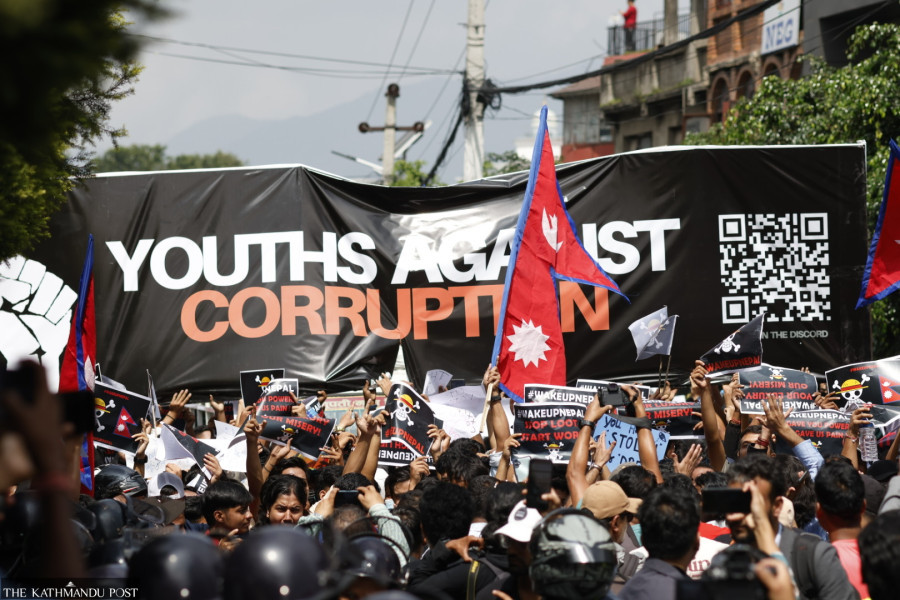Columns
Gen Z’s message for governance reform
A fundamental review of the functioning of the ‘empirical’ state is long overdue in Nepal.
Hiramani Ghimire
Nobel laureates Daron Acemoglu and Simon Johnson contend, in their recent book Power and Progress, that factories led to democratic movements in England in the 19th century by providing opportunities for workers to come together and discuss issues of relevance to reforms. In the words of a writer of that time, “A sort of Socratic spirit will necessarily grow up, wherever large bodies assemble”.
The common space available for debates has been a key driver of significant social and political movements in world history. In September this year, we saw a parallel in Nepal in the form of a Gen Z movement. The only difference was that the space where large bodies of Gen Z protestors assembled was digital. Digital technology is best known for speed, which was also the case with this movement: The ‘revolution’ was executed in less than 30 hours.
What next?
Gen Z protesters were, and still are, fighting for good governance, or against ‘bad governance’, to be precise. They are not demanding tweaks in laws or the replacement of a couple of state functionaries. They are asking for something fundamental. We have an opportunity here to apply some creative thinking to governance reform.
Nepal’s path to governance reform must be transformational. The first critical step is to forge a consensus on what ‘governance’ truly means, breaking free from the restrictive view of it as a simple tool for ‘project management’. This requires deep, systemic changes. To this end, this article proposes a five-part roadmap.
New social contract
At its core, governance should embody a compact between the state and society—a compact that is now deteriorating. The state is a product of what we know as ‘social contract’ (a hypothetical compact, or agreement, between the ruled and their rulers). Core elements of the existing social contract date back to the 16th and 17th centuries. As such, they have failed to check today’s levels of economic disparity, over-exploitation of natural resources and the rise of populism. There are calls at the international level to redefine them in light of socio-political and technological changes that have taken place since.
A World Bank study titled Toward a New Social Contract advocates for a new social contract. This aligns with the findings of a report, Rethinking Society for the 21st Century, of the International Panel on Social Progress, an independent bottom-up initiative bringing together top scholars and thinkers from around the world.
Nepal’s recent history confirms that the existing social contract has led to the social, economic and political disenfranchisement of many people, fuelling a rejection of traditional authority. Most citizens believe that the system does not serve them. With the new social contract, the current governance crisis can be turned into an opportunity to redefine the country’s approach to ‘good governance’.
Co-governance
Co-governance presents a viable strategy for the restoration of public trust, which has been deteriorating in Nepal’s context. This approach entails decision-making arrangements where government agencies, civil society, the private sector and local communities jointly engage in negotiated decision-making. We are seeing an increasing convergence of public, private and social sectors in co-governance. In response, leaders must be equipped with skills to effectively operate at the intersections of these sectors. Co-governance represents a significant upgrade from mere participation by granting partners genuine agency. For this model to succeed, government leaders must be willing to shift their role from steering public action to serving citizens’ goals.
Institutional design
Nepal must develop its own home-grown institutions. The time has come for Nepal to move away from the seductive ‘best practices’ imported from elsewhere and focus on learning from its own ‘mundane’ experience. Evidence shows that externally-driven blueprint models consistently fail. While Nepal has attempted institutional reform for decades, the results have been poor due to several deep-seated issues. Our policy-makers consistently underestimate the time required for meaningful change. For instance, an international study finds that strengthening the rule of law and anti-corruption efforts took 41 and 25 years in slow and fast-moving countries, respectively. In contrast, in Nepal, a strategy prepared jointly by 34 ministry-level agencies of the government aimed to address corruption within one year!
Political finance
Expensive elections have fueled corruption in Nepal. During elections, candidates incur huge expenses and often resort to corrupt practices to recover these costs. Because candidates largely finance their own campaigns, only the wealthy can afford to contest elections, often leading to “free but unfair” elections. The Political Parties Act includes provisions governing donations, but they are hardly enforced.
Nepal must find a way to address this challenge. One solution is state funding of elections. In this system, the government funds political parties and candidates to cover campaign expenses. The International Institute for Democracy and Electoral Assistance, an intergovernmental body working on democracy and election systems, recommends that governments provide direct public funding for political parties annually. The 2004 United Nations Convention against Corruption (UNCAC) also underscores this. Among the database of 181 countries maintained by International IDEA, 125 countries have some form of regulation for state funding.
Debates over political finance laws have taken place in Nepal as well. The recent High-Level Commission for Economic Reforms supports this idea and proposes effective legal measures on political finance in its roadmap for economic reforms.
Service delivery and accountability
The delivery of public services is a fundamental pillar of state legitimacy. Public services are enshrined in Nepal’s Constitution and international commitments like the SDGs. Despite this, a distorted, hierarchical view of the state-citizen relationship remains. This is obsolete. The Nepali state in the 21st century must transition from a ‘guardian state’ model to a ‘partner state’. Service delivery is strongly related to accountability, which is unacceptably weak in Nepal. The accountability deficit is a primary public concern, vividly demonstrated by the recent Gen Z protests. The government is aware of the problem, as evidenced by voluminous reports from its own Auditor General, anti-corruption agencies and parliamentary committees.
Accountability fails in Nepal for three core reasons: First, there is a ‘principal-agent problem’. In government, public officials and elected representatives (the ‘agents’) often act in their own self-interest, violating the trust placed in them by the people (the ‘principals’). The second reason is competitive clientelism. This means a system of discretionary deals between politicians and businesses serves both sides at the public’s expense. Finally, the short shelf-life of power distorts accountability arrangements. As Moises Naim argues in The End of Power, power today is “easy to get, difficult to use and impossible to keep.” This explains why Nepal’s governments, even with strong mandates, avoid decisive action on urgent issues. Knowing that their time is short, incumbents focus on personal gain rather than long-term public good.
A fundamental review of the functioning of the ‘empirical’ state is long overdue in Nepal in view of the massive changes in its political landscape. As we are emphasising a new form of partnership between the state and its citizens, empowering the citizens is equally important.




 11.12°C Kathmandu
11.12°C Kathmandu















